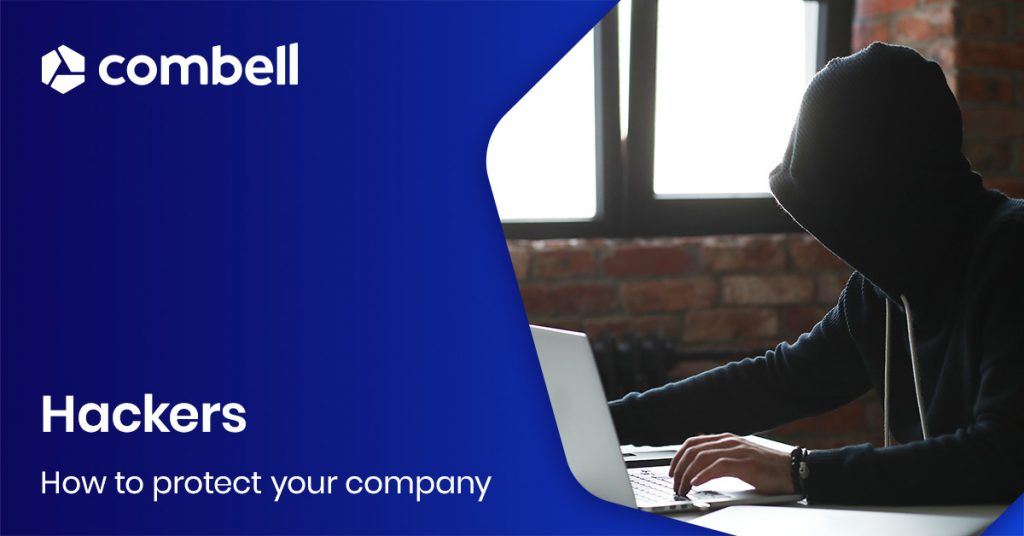5 tips to protect your company against hackers

As digital technologies evolve, hackers are enjoying more and more success. Nowadays, cybercriminals are using advanced methods to damage your company. A small mistake can have huge repercussions and, as an organisation, you have to be prepared as best you can for an incident and protect your company against hackers. But how do you go about that?
Download our cybersecurity e-book
Cyber incidents: big impact on your organisation
A cyber incident will have a big impact on all layers of your organisation. This kind of attack is accompanied by high costs and may cripple business systems, meaning that your staff will no longer be able to work. And hackers may infiltrate your organisation via different routes. This means that the security policy needs to encompass every facet of your business operation: from management to employees and the infrastructure. These are 5 key guidelines that companies can use to limit their weak points and protect themselves against hackers, data breaches and cyberattacks.
Read more: The 5 most common types of cyber attacks
1. Get the management involved
 These days, cybersecurity is all too often left to the IT department. Although CFOs and CEOs seem increasingly aware of the need for information security, in practice it is all too often the task of the IT department on its own. And yet the entire company is involved in this threat. An initial and vital step towards a 360-degree security policy is getting management involved. Get directors to sit down with the IT department to develop a widely supported policy. A central plan of approach will enable security measures to be carried out more efficiently.
These days, cybersecurity is all too often left to the IT department. Although CFOs and CEOs seem increasingly aware of the need for information security, in practice it is all too often the task of the IT department on its own. And yet the entire company is involved in this threat. An initial and vital step towards a 360-degree security policy is getting management involved. Get directors to sit down with the IT department to develop a widely supported policy. A central plan of approach will enable security measures to be carried out more efficiently.
Tips for the management:
- Make a single person responsible for security within the company
- Perform a risk analysis and identify weak points
- Draft an action plan for cybersecurity in the future
- Draw up a contingency plan in case of cyber incidents
- Respect the statutory regulations for information security
- Have management inform employees about initiatives being taken
2. Increase employee awareness
Employees are often the weakest link in the security chain. According to Infosecurity Magazine, 90% of the data breaches in 2019 involved staff. People click on the wrong link, open a bad e-mail or accidentally send confidential information to third parties. A mistake can happen very quickly and the risks may be enormous.
For that reason, user awareness about the importance to protect your company against hackers is also a key topic for information security today. Organise courses for your employees so they are better prepared for a cyberattack. Also carry out regular evaluations on the knowledge and responses of users.
Tips for employees:
- Develop a code of conduct for IT use and share this with your employees
- Set out security roles and responsibilities
- Organise courses on the various forms of cybercrime
- Teach your employees about privacy and how they should handle sensitive data
- Evaluate and test the knowledge and responses of users
- Make cybersecurity a part of appraisal interviews
3. Protect your equipment against hackers
 The number of devices with an Internet connection is steadily increasing around the world. From 10 billion connected devices in 2016 to 50 billion in 2020. That is an average of 8 devices per person. Companies too are experiencing this influx of devices. Employees often have both a smartphone and a laptop in order to perform their duties. The use of smartwatches and tablets is also growing in the workplace. And then there are the IoT devices like smart cameras and sensors in the supply chain. But the fact that all these devices have a network connection exposes your business to risks. Hackers can break into your IT systems via an Internet connection. This means that your devices need to be properly protected to prevent that possibility.
The number of devices with an Internet connection is steadily increasing around the world. From 10 billion connected devices in 2016 to 50 billion in 2020. That is an average of 8 devices per person. Companies too are experiencing this influx of devices. Employees often have both a smartphone and a laptop in order to perform their duties. The use of smartwatches and tablets is also growing in the workplace. And then there are the IoT devices like smart cameras and sensors in the supply chain. But the fact that all these devices have a network connection exposes your business to risks. Hackers can break into your IT systems via an Internet connection. This means that your devices need to be properly protected to prevent that possibility.
Tips for securing devices:
- Draw up a Bring-Your-Own-Device policy with guidelines for employees who use their own equipment at work
- Perform updates for software on devices automatically
- Update antivirus programs on a regular basis
- Regularly back up the data on your devices
- Consider using two-factor authentication to make devices more secure
- Disable the autorun features of external media
‘A security policy needs to encompass every facet of your business operation: from management to employees and the infrastructure.’
4. Invest in your website
Just about every company has a website nowadays. Now that customers are increasingly shopping and searching for information online, a good website is your company’s business card. But websites are vulnerable to attacks just like other information systems. There are various tools you can deploy to guarantee the reliability of your website. Examples are a firewall, backups, up-to-date antivirus programs and so on. In addition, the hosting of your website is a crucial factor. With the right hosting services, you can deter criminal visitors or ensure they cannot cause any damage.
Tips for securing your website:
- Choose the hosting package that suits your website.
- Install a dedicated firewall to protect your website.
- Back up your data and think about database security
- Invest in SSL certificates and extra backup with end-to-end encryption
- Ensure that messages from forms are sent only to the strictly necessary recipients
5. Protect your IT infrastructure against hackers
As information systems become increasingly complex, so too does your company’s IT infrastructure. Your IT infrastructure includes all the elements that keep your digital processes running. Think here of servers, storage and networks, but software and cloud as well. Over and above all that, there are of course physical devices, such as computers, smart cameras and printers. All of these individual elements are connected with each other and are therefore vulnerable to hackers.
Investing in IT security starts with an inventory of the different pieces of the jigsaw. Identify the vulnerabilities for each element and draw up a number of measures for dealing with them. The list below is not exhaustive, but it does give you a good idea of several actions you can take to secure your infrastructure.
A security policy is only as strong as the weakest link. For true security, you have to take each element in your IT environment into account. But always remember that 100% security does not exist today. Each piece of software, hardware or network may contain vulnerabilities about which you are unaware. For that reason, vigilance is doubly important in these digital times. With these 5 tips, you are well on your way to protecting your environment as best you can against cybercriminals. And a good IT partner that can assist you in being as secure as possible is worth its weight in gold.
Network
- Manage access to your networks with access control
- Choose network monitoring software that tracks problems in real time
- Set up a separate guest network with its own access code
- Secure your WiFi with WPA2 encryption
Servers and storage on site
- Choose servers and storage components with built-in security
- Restrict physical access to your servers
- Retain security logs for servers and firewalls for at least a month
Servers,storage and applications in the cloud
- Invest in the right type of cloud for the right workload: private cloud, hybrid cloud or public cloud
- Choose a reliable provider that can give guarantees for outages, downtime or data loss
- Check whether the cloud you choose is compliant with data regulations and legislation
Software
- Maintain an inventory of all software licences
- Use a configuration management tool
- Study the security clause in contracts and SLAs
- Install updates and patches immediately, including those for software from third parties, such as browsers and plugins
Backups
- Back up your important data on a daily basis
- Choose the right type of backup for your company: in the cloud, on-premise or both
- Perform regular recovery tests to check the quality of the backups
Follow these tips and you'll protect your company as good as possible against hackers.


